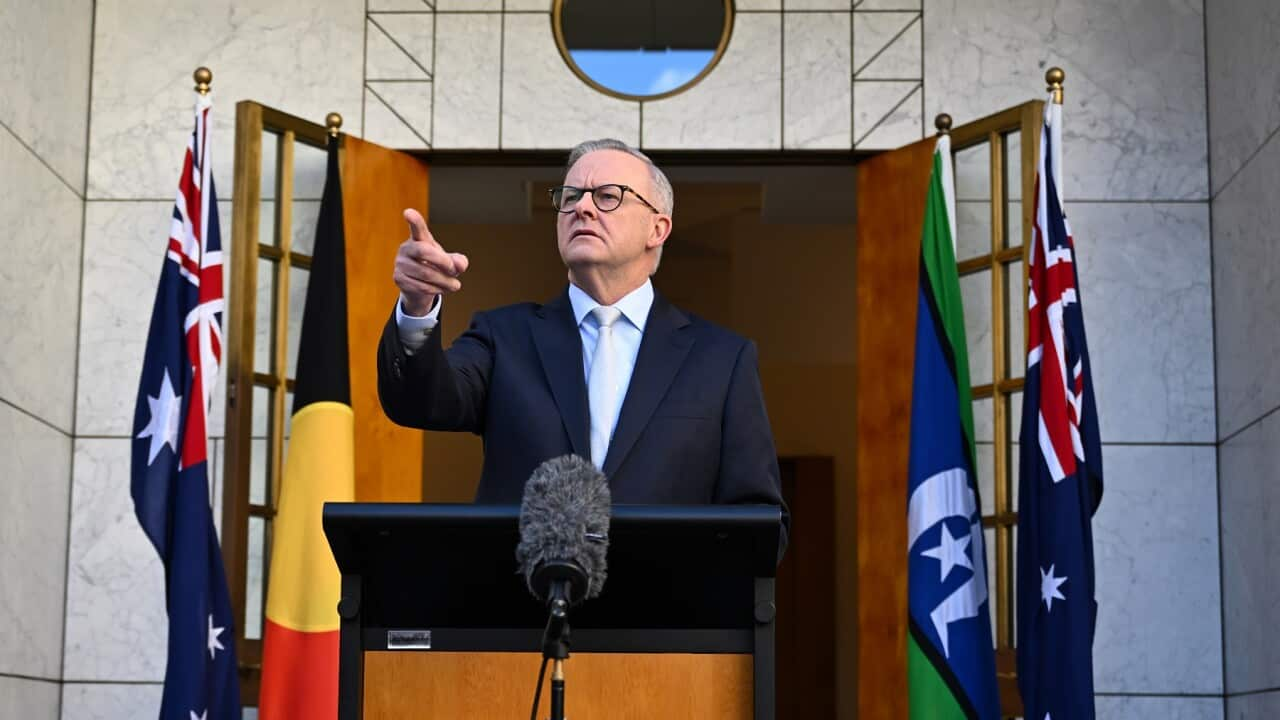TRANSCRIPT
Could AUKUS become JAUKUS?
The trilateral security partnership - announced in September 2021 - is an arrangement between Australia, the UK and the US to develop Australia's nuclear submarine forces, with the goal of improving stability and security in the Indo-Pacific.
Now, those founding members say they're considering working with Japan as a technological partner.
Prime Minister Anthony Albanese says there are a number of reasons why such a collaboration makes sense.
"We're engaging in our defence relationship with Japan across the board extensively. We have upgraded that defence relationship. And it is a natural thing for us to look at Pillar Two to co-operate. Japan is of course a Quad partner, along with the United States and India. And we see this as a natural evolution that is occurring."
The plan to replace Australia's current fleet of diesel electric submarines in the 2030s [[with nuclear-powered submarines]] is what's being called Pillar One of AUKUS.
Pillar Two outlines a plan to share advanced technologies such as hypersonic missiles, undersea drones and electronic warfare.
It is this Pillar Two that Mr Albanese says AUKUS members are open to seeing more like-minded nations contribute to.
"Let's be very clear. There is no plan to expand AUKUS beyond the three countries. When it comes to Pillar Two, Japan has a very sophisticated - not just defence force but is known for its technological advancement. If there are gains that are in the interests of the three AUKUS partners, but in addition to any partners outside the direct AUKUS relationship then that will be considered.”
No formal invitation has been accepted and announced, but US officials have indicated in public remarks that an arrangement is close to being finalised.
A formal announcement could come during Japanese Prime Minister Fumio Kishida's week-long official visit to the United States [[from 10 April]], including a summit with President Joe Biden - and later, the first-ever summit of the US, Japanese and Philippine leaders.
China’s influence in the Indo-Pacific, including its actions in the South China Sea, are part of the backdrop of discussions on regional security.
Chinese foreign ministry spokeswoman Mao Ning says any involvement of Japan with AUKUS is strongly opposed by China.
"The countries concerned should effectively fulfill their international obligations and refrain from any action that undermines regional and world peace and stability. Owing to its recent history of militaristic aggression, Japan's military security trends have always been of great concern to its Asian neighbouring countries and the international community. The Japanese side should effectively reflect on its history of aggression, abandon the practice of engaging in a military-security partnership, and truly follow the path of peaceful development.”
East Asia scholar Professor Derek McDougall - at the University of Melbourne - says Japan's policy on pacifism, enshrined in the country's constitution, won't be a barrier from Japan contributing to AUKUS.
"Defence forces in Japan are called self-defence forces, but there are restrictions on using those forces. So you could have technological co-operation, without Japan necessarily expanding its defence role. In terms of that arrangement being a form of soft-balancing against China."
Japan is not a part of the Five Eyes intelligence alliance, which includes Australia, Canada, New Zealand, the United Kingdom, and the United States.
John Blaxland is a professor of international security and intelligence studies at the Australian National University.
He says there are barriers that would need to be overcome, if Japan were to get involved with Pillar Two of AUKUS.
"And it has some issues in terms of its own security precautions that have a bit of reputation over the last couple of decades of being a little bit lax. Now they have put in place new legislation just very, very recently to tighten up those procedures. But we have yet to see that implemented and we have yet to see that have the knock-on effect in terms of just how robust Japanese security measures may prove to be. In Australia, I have written about this. We've been subject to leaks as well - of espionage, selling and giving away information to people who are not entitled to have it. We have made some significant modifications and refinements to our procedures along the way. And I think there is a sense that Japan probably has a bit of catch up to do on that front."
New Zealand, Canada, South Korea have also been named as potential partners and collaborators for AUKUS.
Dr Reuben Steff is an international relations and global security academic at New Zealand's University of Waikato.
He says there is growing interest among New Zealand's government officials in contributing to AUKUS Pillar Two.
The country's 1987 ban on nuclear weapons and propulsion precludes it from considering Pillar One.
"They have more interest now than ever. It surprised quite a lot us (defence and security analysts) last year when the Chris Hipkins government showed interest - because historically Labor has been a little more hesitant about getting too close to our traditional partners - Australia and the United States. With this government though, they have continued the trend that Chris Hipkins established where last year New Zealand was saying it was exploring opportunities when it came to AUKUS. This government has taken it further. If you look at the statements, the activities of our new Minister of Defence, Judith Collins. And if you look at what Winston Peters, our Minister of Foreign Affairs is saying. They seem to be showing a lot of openness to AUKUS Pillar Two...Expansion of China's military power in the region - and its interest in gaining potentially a security foothold in the South Pacific. It is also just technology itself. We have a small economy. We require foreign technologies to make sure that things tick over neatly. Also, monetary - it's investments."
Dr Euan Graham is a senior analyst with the Australian Strategic Policy Institute.
He says there could be a downside to having too many nations in AUKUS.
"I think weighing against that is the basic arithmetic of if you have open up a small focus partnership to broader participations, there is always going to be penalty you pay in terms of process. And just the general unwieldiness of having to deal with more than three parties will inevitably slow it down. I think the question needs to be thrown back: What does New Zealand and Canada have to offer. It is really for them to present a value proposition that is of interest to the AUKUS partners. And to do so in a way that doesn't appear to jeopardise the focus on Pillar One. From an Australian perspective, that is the bottom line. That is why AUKUS originated. Australia's concern and increasingly urgent desire to acquire a higher level of submarine capability. And the longer that gets delayed, the more angst there will be in Canberra."













